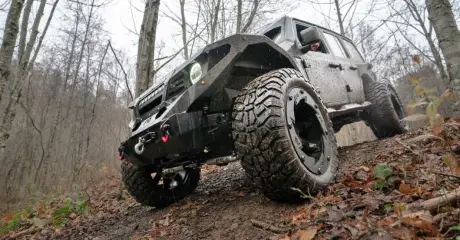
Are you planning to leave the paved roads with your car, truck, or SUV? Then you need tires that can cope with the special challenges of the terrain. In addition to the usual good grip on wet and dry roads, you also need to consider other factors when buying off-road tires, such as solid grip off-road, puncture resistance, and tire load-bearing capacity.
In this article, we are going to tell you about different types of off-road tires.
What are off-road tires?
High-quality off-road tires carry the vehicle over stones, rubble, sand, dirt, snow, mud, and uneven terrain. The tires require a specially developed tread pattern and the grooves between the tread blocks must be wider. Off-road tires also have reinforced sidewalls for high puncture resistance.
When it comes to pure performance on asphalt, however, off-road tires cannot compete with high-quality summer tires. This is because off-road tires have a smaller contact area, so the tires have less contact with the road surface during rotation.
In the city, off-road tires offer less grip and are louder. In addition, your vehicle would use significantly more fuel.
You should also keep in mind that the profile of off-road tires wears out faster due to the soft rubber compound, which ensures the best possible performance off-road. The average is just under 65,000 kilometers, with some models even up to 112,000 kilometers.
What are the types of off-road tires?
All-terrain off-road tires
If you drive your SUV mostly on different surfaces (terrain and road), for example, because you commute from the city to the country, you would certainly benefit from all-terrain tires.
These off-road tires are characterized by an interlocking tread design that is durable enough to handle dirt, gravel, and grass, but also allows a quieter and more comfortable ride on paved roads. Please note, however, that all-terrain off-road tires are not to be equated with all-season tires.
Mud terrain off-road tires
When you typically get off the paved roads and explore new terrain, mud terrain off-road tires are an ideal choice. These off-road tires have a more aggressive profile and offer the best grip even in the most extreme terrain, ideal for wet snow and mud.
Thanks to the reinforced sidewalls, which absorb the bumps on stony ground and damage from other hazards in the terrain, these off-road tires are also extremely robust.
Snow off-road tires
In areas where ice and snow are not uncommon, consider getting a set of good-quality snow off-road tires. These tires stay soft and supple even in sub-zero temperatures. The tread blocks have sipes (small grooves and channels) that have a good grip on snow and ice for better traction in icy weather conditions.
Important tips for your off-road tires
In all-wheel-drive vehicles, all four tires should be replaced at the same time if necessary. The drive mode requires tires of similar diameters or levels of wear to limit damage to some mechanical parts, such as the differential. Ultimately, this could lead to costly repairs.
For high-performance traction in your vehicle, you should systematically observe the following two measures:
- Mount four identical tires on your vehicle, i.e. the brand, profile, size, load, and speed index as well as the usage category match.
- Ensure an even degree of wear on all four tires by swapping the tires, for example, every seasonally required tire change, or at least three times over the entire tire life.
Same articles

Understanding Vehicle Inspection and Verification Services: Why They Matter for Every Driver
GuidesVehicle inspection and verification services are an essential but often overlooked part of keeping roads safe and cars legally compliant. Most people only think about inspections when it’s...
KLIFEX Brand Overview: High-Quality Automotive Repair Kits for Affordable Repairs
GuidesThe automotive aftermarket has long needed solutions that combine reliability, durability, and affordability. Many car enthusiasts and services are looking for a way...
Fast, Reliable Vehicle Emissions & Inspection Services Made Simple
GuidesFast, reliable emissions and inspection services are essential for keeping vehicles road-ready, compliant with environmental regulations, and safe for daily driving. If you’re looking for quick...

